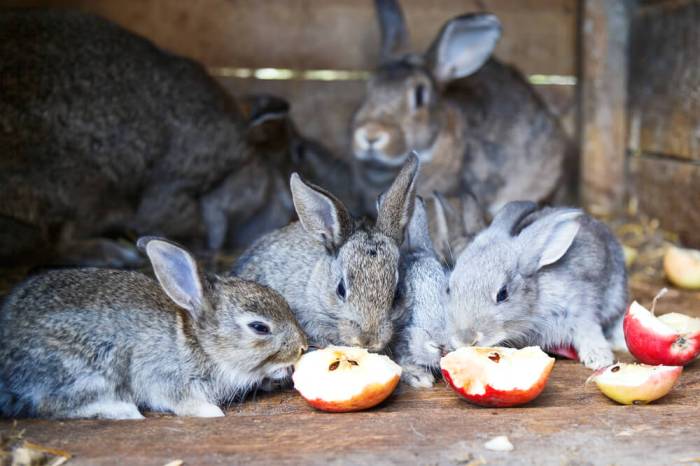Apples are a ubiquitous fruit, enjoyed by humans and animals alike. But can rabbits eat apples? The answer is yes, but with moderation. Apples offer a range of nutritional benefits for rabbits, but excessive consumption can lead to digestive issues.
This guide will explore the nutritional value of apples for rabbits, the potential health considerations, and how to prepare and serve apples safely.
Rabbits are herbivores with a digestive system designed to process plant matter. Apples, being a fruit, contain essential nutrients that can supplement a rabbit’s diet. However, it’s important to note that apples are high in sugar and should be given as treats rather than a staple food.
Nutritional Value of Apples for Rabbits

Apples offer a range of essential nutrients that can benefit rabbits. They contain vitamins A, C, and E, which are crucial for overall health and well-being. Apples are also a good source of minerals such as potassium, calcium, and phosphorus, which support bone development and muscle function.
In addition, apples contain antioxidants like quercetin and kaempferol, which help protect cells from damage caused by free radicals. These antioxidants may play a role in reducing the risk of chronic diseases such as cancer and heart disease.
Sugar and Fiber Content
Apples are a moderate source of sugar, with approximately 10 grams per 100-gram serving. While sugar can provide energy for rabbits, excessive consumption can lead to weight gain and dental problems. Therefore, it is important to limit the amount of apples given to rabbits and to avoid offering them as a primary source of nutrition.
Apples are also a good source of fiber, which is essential for maintaining a healthy digestive system. Fiber helps to regulate bowel movements, prevent constipation, and promote a feeling of fullness. The insoluble fiber in apples, known as cellulose, adds bulk to the stool and helps to move food through the digestive tract.
Health Considerations
Feeding apples to rabbits can pose certain health risks if not done in moderation. The high sugar content in apples can lead to digestive issues, especially if consumed excessively. It is crucial to understand the potential risks and feed apples as a treat, not a staple food.
Digestive Issues
Excessive apple consumption can disrupt a rabbit’s delicate digestive system. The high sugar content can cause fermentation in the gut, leading to bloating, gas, and diarrhea. These digestive issues can be uncomfortable and even life-threatening if left untreated. Additionally, the fiber in apples can be difficult for rabbits to digest, especially if they are not accustomed to it.
Importance of Moderation
To avoid these health risks, it is essential to feed apples in moderation. A small piece of apple, no larger than a tablespoon, can be offered as an occasional treat. This allows rabbits to enjoy the taste and nutritional benefits of apples without overdoing it.
Proper portion sizes and feeding frequency should be strictly adhered to for the well-being of your rabbit.
Preparation and Serving Suggestions
Before offering apples to rabbits, it’s crucial to prepare them appropriately. Remove any seeds, stems, and leaves, as these parts can be harmful to rabbits. The seeds contain amygdalin, a compound that releases cyanide when ingested, while the stems and leaves may contain small amounts of toxins.
Cutting and Serving
Cut the apple into small, bite-sized pieces to prevent choking hazards. You can offer these pieces as treats or supplements to their regular diet. Avoid feeding large quantities of apples, as they contain high amounts of sugar. Start with small portions and gradually increase the amount as tolerated.
Alternative Treats and Supplements
While apples can be a nutritious treat for rabbits, it’s essential to provide a varied diet that includes other healthy options. These alternatives offer different nutritional benefits and can help keep your rabbit’s diet balanced and interesting.
Leafy Greens
- Romaine lettuce: Rich in vitamins A and C, calcium, and fiber. Introduce gradually to avoid digestive issues.
- Spinach: High in vitamins A, C, and K, but should be offered sparingly due to its high oxalic acid content.
- Kale: Excellent source of vitamins A, C, and K, as well as calcium and antioxidants.
Herbs
- Basil: Contains antioxidants and anti-inflammatory compounds. Offer in moderation.
- Parsley: Rich in vitamins A, C, and K, as well as iron and potassium.
- Cilantro: Contains vitamins A and C, as well as antioxidants. Introduce gradually to avoid digestive issues.
Vegetables
- Carrots: High in vitamin A and beta-carotene, which are essential for eye health.
- Bell peppers: Rich in vitamins A, C, and K, as well as antioxidants and fiber.
- Broccoli: Excellent source of vitamins A, C, and K, as well as calcium and fiber. However, limit intake due to its high gas-producing potential.
Fruits
- Berries: Rich in antioxidants and fiber. Offer in moderation due to their high sugar content.
- Bananas: High in potassium and fiber, but should be offered sparingly due to their high sugar content.
- Papaya: Contains vitamins A, C, and K, as well as digestive enzymes that can aid digestion.
Final Summary
In conclusion, rabbits can eat apples in moderation. Apples provide essential vitamins, minerals, and antioxidants, but excessive consumption can lead to digestive issues. When offering apples to rabbits, it’s crucial to remove the seeds and stems, and to monitor their intake.
By following these guidelines, you can ensure that your rabbit enjoys the occasional apple treat while maintaining a healthy and balanced diet.
Questions and Answers
How often can I give my rabbit apples?
Apples should be given as occasional treats, no more than once or twice a week.
What is the best way to prepare apples for rabbits?
Wash the apple thoroughly, remove the seeds and stems, and cut it into small pieces.
What are some alternative treats I can give my rabbit?
Other healthy treats for rabbits include carrots, celery, bananas, and blueberries.